Pajama Sam is a heartwarming reminder of my own PC gaming origins
The perfect throwback to adventure games on PC.

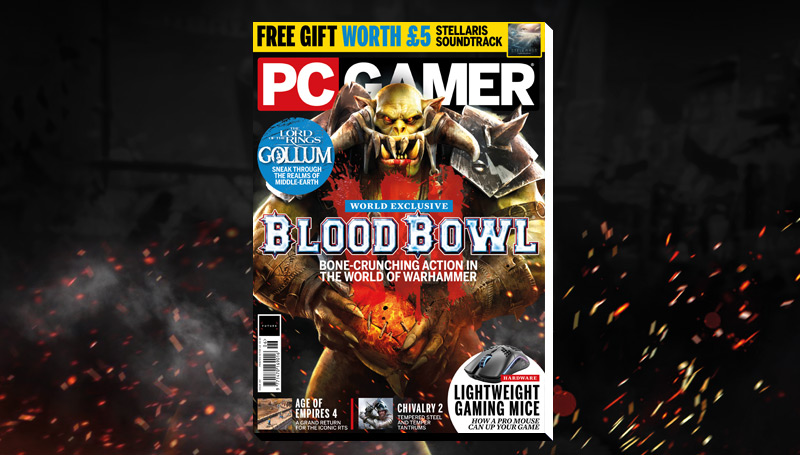
This article first appeared in PC Gamer magazine issue 356 in May 2021, as part of our 'Reinstall' series. Every month we load up a beloved classic—and find out whether it holds up to our modern gaming sensibilities.
I'm not afraid of the dark. I'm not! But I am afraid of what PC gaming would look like without Pajama Sam. A whole generation of PC gamers grew up after the heyday of adventure games, but were too young and oblivious to notice the rapid descent of a genre. All kids knew was the computer desk, a treasure trove littered with old CDs, many of which had a game from Humongous Entertainment tucked away somewhere. And it was scratched to hell probably, sending CD-drives into whirring, heaving fits—working nevertheless. Playable cartoons. That's what we thought of them, and Pajama Sam's big adventure in a surreal nighttime world hidden in his closet might've been the best of the bunch.
In Pajama Sam: No Need to Hide When it's Dark Outside, you take on the role of Pajama Sam himself, finally confronting the darkness hiding away in his closet. As a kid, he's scared of the stuff, but it's not as easy as stowing away the concept of darkness into a lunchbox like Sam hopes. Once in the closet, the kid trips and falls into a Pee-Wee- Hermanesque realm of darkness where everything has a face, from trees to meat grinders. After the transdimensional fall, Sam loses some key darkness banishing items, so your task is to find them and march up to the tip-top of a spooky treehouse to finish the fight off.
From here it plays like an abbreviated LucasArts point-and-click adventure, and for good reason. Ron Gilbert, of Maniac Mansion and The Secret of Monkey Island fame, teamed up with producer Shelley Day to create Humongous Games in 1992, a name contributed by none other than LucasArts cohort Tim Schaefer. Writer of The Secret of Monkey Island and its sequel LeChuck's Revenge, Dave Grossman, came on to pen Pajama Sam, so it retains a familiar mix of visual gags propped up by a simpler, but equally goofy form of adventure game logic in the puzzles.
Without a paddle
The art and animation still stand up, though I remember it looking nicer on a fuzzy CRT. They had a way of blending the low-res pixelated scenes into something that more mirrored what I was watching on TV every Saturday morning.
What I mean: to get across a river, Sam needs to convince a boat that the rumours aren't true, wood doesn't sink. So you fish a plank out of a creek, framed and animated so prominently in the scene that no kid would miss it, and toss it in the water near the beached boat. Its mind blown, the boat leaps into the water and offers to take Sam wherever he pleases—but the moment you leave the scene, the plank, still floating there in the foreground, quietly sinks. I barked like a dog, a joke that flew over my head years ago smacking me in the dome all these years later. That boat's going to fucking drown.
The art and animation still stand up, though I remember it looking nicer on a fuzzy CRT. They had a way of blending the low-res pixelated scenes into something that more mirrored what I was watching on TV every Saturday morning. Even so, Sam never stiffly tiptoes between scenes. He springs up and leaps and dives, an elastic little guy with almost no repeating keyframes. An entire room of living furniture has an infinite dance party, a talking minecart takes Sam on a ride through a mountain on a physics-defying track, Sam liberates carrots from the kitchen in a cute musical number—No Need to Hide is lovely in motion.
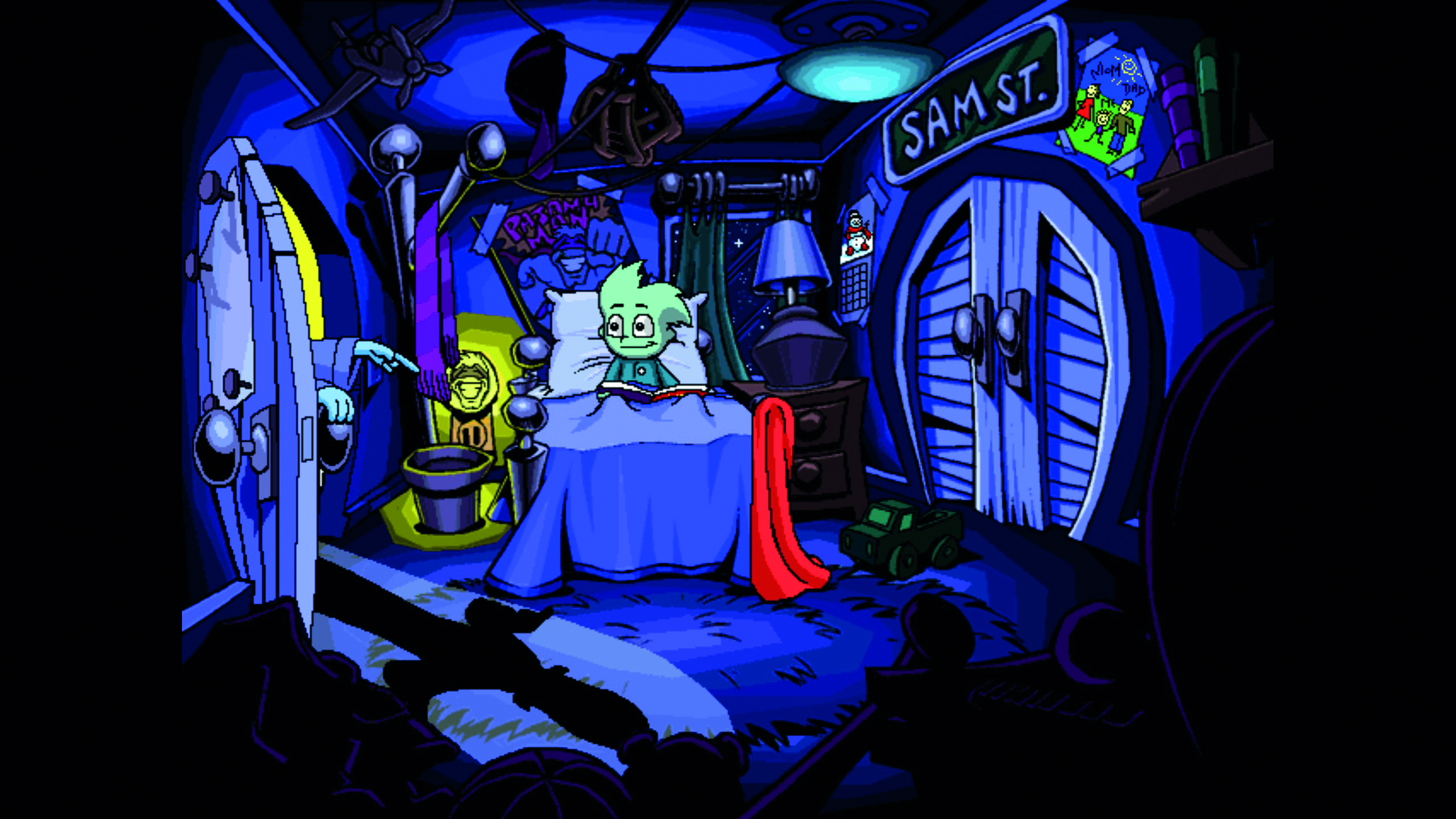
Pajama Sam knows kids aren't going to make it through the space between narrative beats, the time in every adventure game where you're stuck staring at an idle screen, pixel-hunting for a missed object or interactive piece of scenery. Click on nearly any part of a screen and something will happen. A tree root will grow a face and moan about how they didn't have videogames back in their day. A pizza will fall out of the sky onto a tennis racket. Flowers will play Patty Cake. A gorilla will appear in a smudge of darkness, whip out a banana, and have a quick snack.
Sam doesn't acknowledge any of the animations, a bizarre purgatory between the reality of the player and the fiction taking place—but as a kid, it was a damn cartoon buffet. There are dozens of tiny, bespoke animations to stumble over on the way to the next item or clue, and nearly every one of them is funny, or just so odd you can't help but laugh. It's honestly the level of interactivity I would've welcomed in adventure games designed for any age. A simplified verb set and a reactive environment go a long way in preserving patience.
The biggest gaming news, reviews and hardware deals
Keep up to date with the most important stories and the best deals, as picked by the PC Gamer team.
Sam's a lovable kid, too, in large part thanks to Pamela Adlon's enthused performance. You'd probably recognise the voice instantly. Adlon's also behind one of the greatest animated characters of all time: Bobby from King of the Hill. More recently you might've seen her on the excellent series Better Things, where she writes, directs and plays the lead. Coincidentally, I started watching it the same week I returned to Pajama Sam. An odd thing, to hear the same voice go from being scared of the dark to making jokes about going through menopause. Humongously entertaining, indeed.
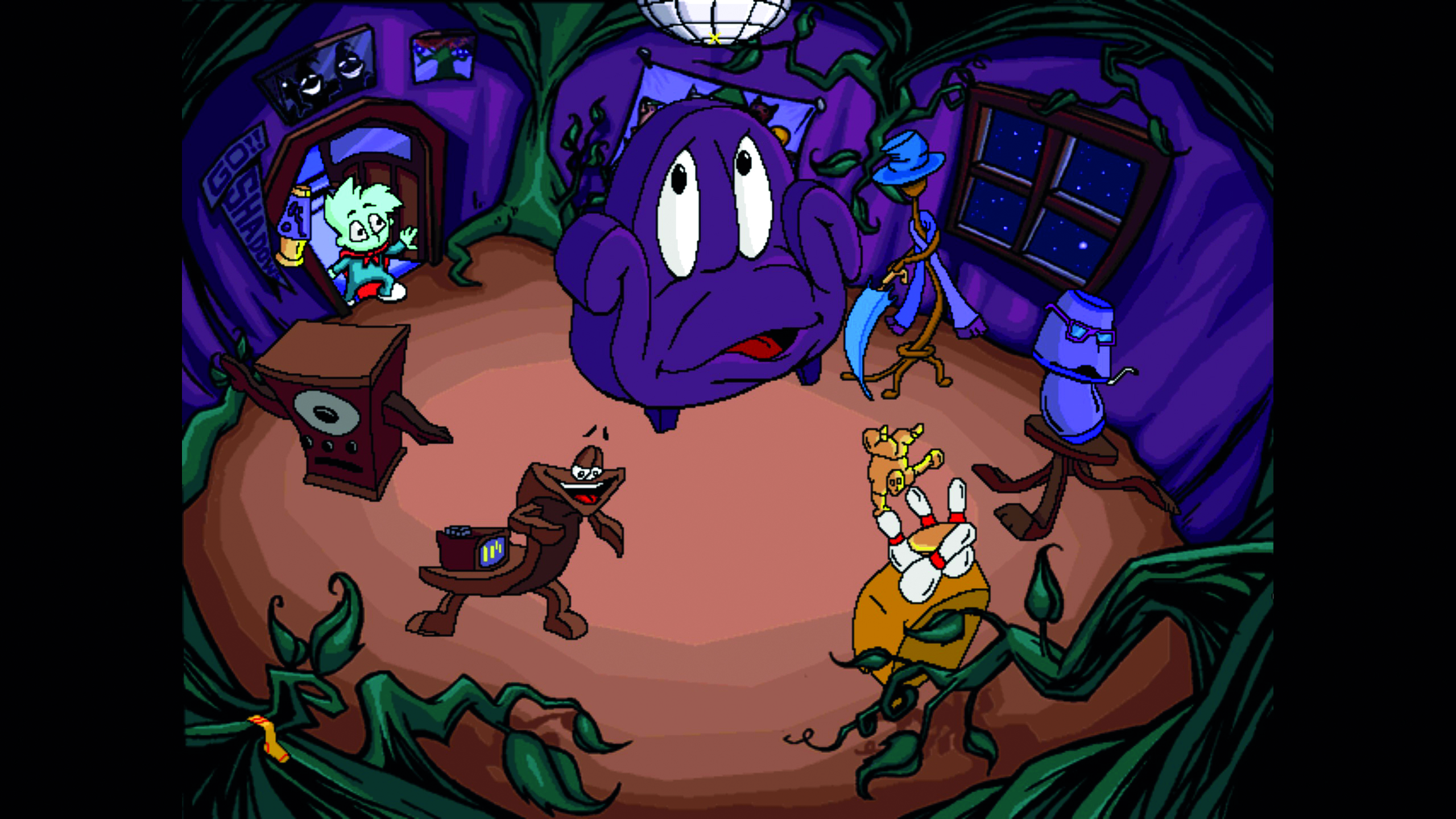
Pajama Sam had to be. A single adventure game had to sustain four kids, minimum, for a couple weeks. I met most of my friends at Julie's, someone that kindly watched half the kids in the neighbourhood. Miraculously, she gave us free rein on the computer. We played together, bunched around the computer after school almost every day. Back at school we discussed theories in the sandbox and spouted epiphanies when our swings passed. We should use the doorknob on the door without a doorknob! Baby geniuses.
Revisiting Pajama Sam has been a heartwarming reminder of my own PC gaming origins, and I'm sure I'm not alone here, which makes it an easy recommendation to pick up and play again no matter your age.
We never did crack the whole case on our own, stuck trying to find where to read the water meter in the mines in order to win a quiz show hosted by living doors. While Pajama Sam never got to rubber-with-a- pulley-in-the-middle levels of convoluted, it was still quite difficult to parse for our developing minds. Kids are pretty dumb, turns out.
The bottom dropped out when my buddy Brian's family got internet and we discovered GameFAQs. The local adventure game market crashed overnight for most of the neighbourhood. We ripped through the whole Humongous catalogue in about a week at Julie's. I lost a family that day. But I also found a new one in the CD bargain bin at Staples. The LucasArts Archive collections probably changed a lot of lives—$10 for Day of the Tentacle, Sam and Max Hit the Road, and a handful of other LucasArts games would do the same to anyone. Revisiting Pajama Sam has been a heartwarming reminder of my own PC gaming origins, and I'm sure I'm not alone here, which makes it an easy recommendation to pick up and play again no matter your age. It's a breezy two-hours for my big adult brain. Join me: humiliate the memory of your stupid kid self.
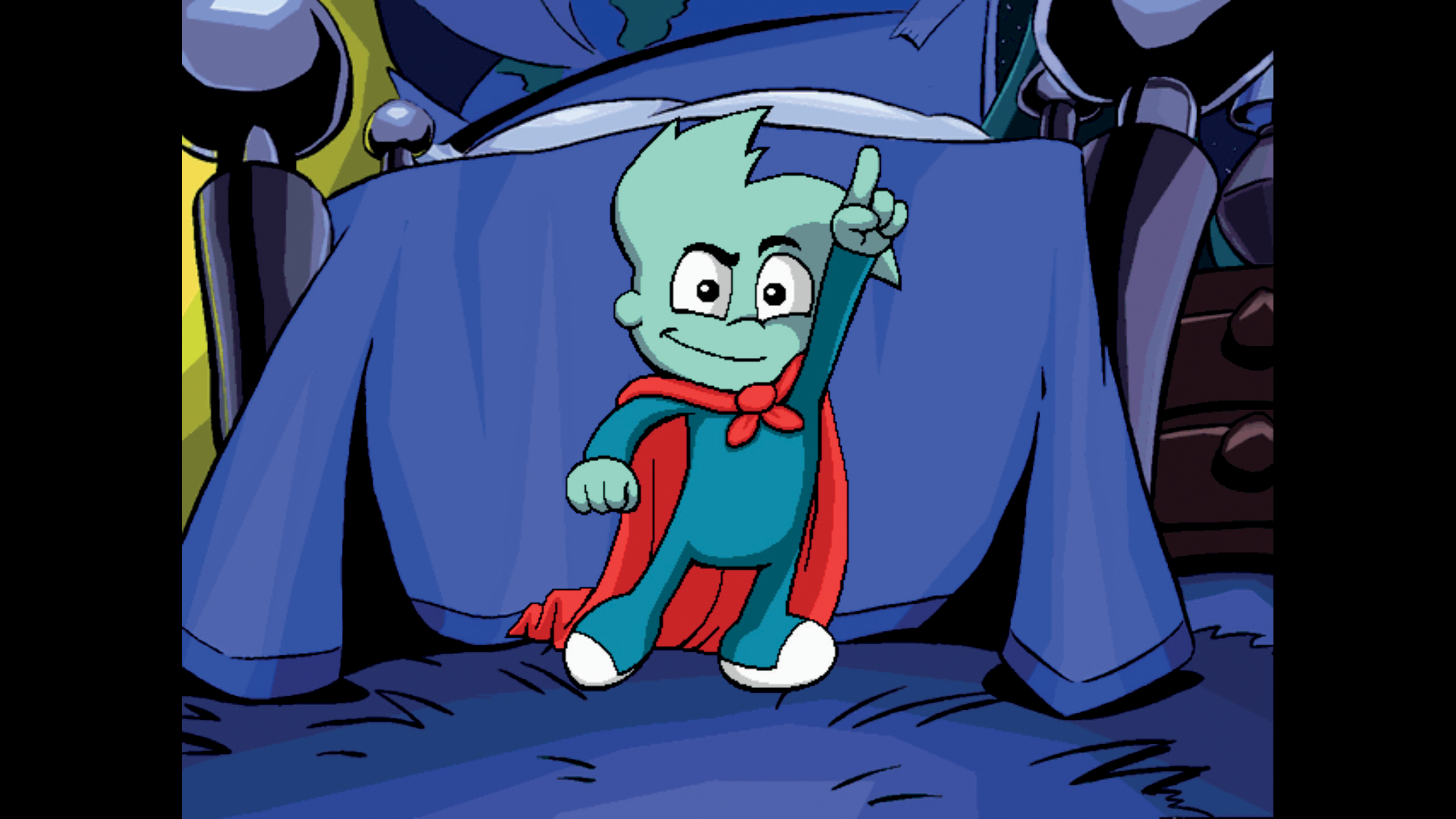
Luckily, most Humongous Entertainment games are easy to find and play today, thanks to Nightdive Studios, the studio responsible for keeping dozens of old games working on modern machines, including the upcoming remake of System Shock. I expected to get frustrated and bored with Pajama Sam, to play purely for the nostalgia, but I was delighted throughout, even if the narrative is literally: the dark isn't that bad. Believe it or not, I've already overcome my fear of the dark. I can sleep in total darkness and not wet the bed once all night. Sure, I have to pay bills now and my brain eats itself in new ways, like fearing the death of my parents or the collapse of a state's entire infrastructure or the incoming eco-apocalypse, but Pajama Sam helped me nip that whole dark thing in the bud for me 25 years ago. I'm actually very grateful.
Bothered by bugs
The only major caveat weighing down my hot air balloon ride into the past are a couple bugs present in the Steam version of Pajama Sam. Some scenes don't always load in crucial interactive objects properly, or at all. A late game puzzle requires Sam to find some oars in order to fish something out of the water. They're normally propped up on a wall in a room with an organ and a talking bust, but in my instance? Nothing. No oars, even though I could climb the organ and leap on the chandelier to initiate an interactive swinging sequence in which the oars snap into existence.
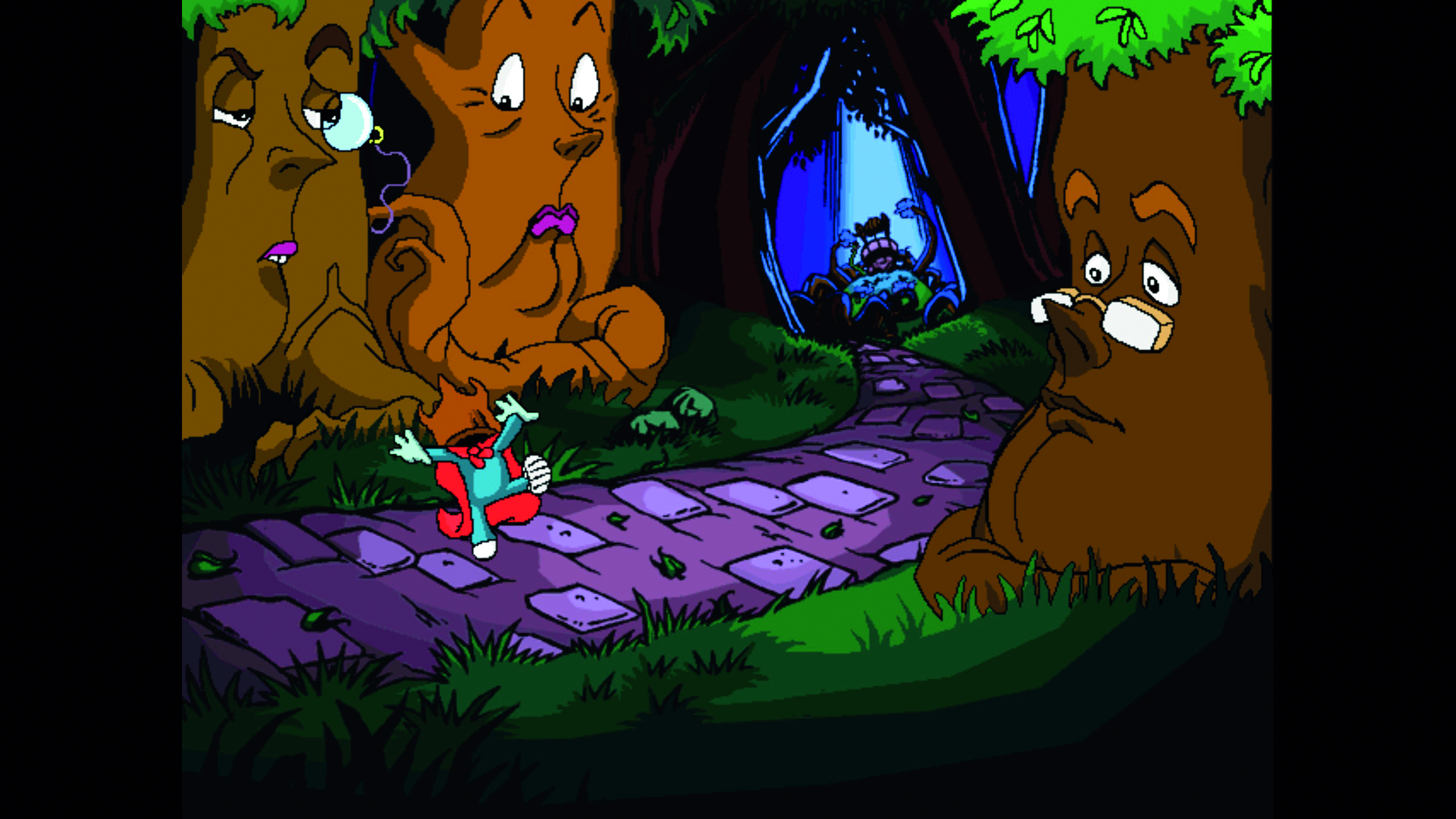
Worse, though, is that even though I could see the oars, I couldn't ever finish the swinging minigame. Sam would reach out, I would time my clicks to give him momentum, but the oars were forever just out of reach. A quick Google search confirms little game-breaking bugs like this are somewhat common, so keep that in mind before dipping back in. If it's any assurance, it's a short game already, and you can jam escape to skip literally any animation. I got back to the same sequence, unbugged, in about ten minutes.
I was adamant about seeing the game through, bugs and all, so maybe Sam's got some staying power. If you're a mother, father, uncle, aunt, babysitter—whatever, humour me. Plop a kid in front of Pajama Sam, see what happens. Kids are growing up with touch devices, so the point-and-click interface should be pretty easy for them to figure out. Tell them you have a new cartoon for them to play, say it's from the creators of Baby Shark or whatever. Lie to them. This is important. Because if they like it, Quake is right around the corner.
James is stuck in an endless loop, playing the Dark Souls games on repeat until Elden Ring and Silksong set him free. He's a truffle pig for indie horror and weird FPS games too, seeking out games that actively hurt to play. Otherwise he's wandering Austin, identifying mushrooms and doodling grackles.


